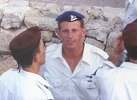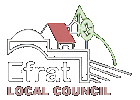Hagai was born in Even Shmuel on
Simchat Torah – October 23, 1978, to his parents Noa and Shimon. He was
the fifth of six children in his family along with Aynat, Nadav, Amichai, Yael and
Gitit. Hagai was a typical redhead: The personality of a redhead, the
freckles, and a huge smile. When he was little he used to leave the
house to wander on the paths, through the parks, and out into the big
open fields until he would finally get lost. Several times it was
necessary to send out a search team after the lost child.
When Hagai was five, he moved with his family to Efrat, which is located in
Gush Etzion. There he went to kindergarten, and along with his good
friend Tzion he would escape whenever possible. The school system was
not designed to suit Hagai, and there were not many classes in which he sat
until the end. Many of his days in school were spent in the principal's
office, the janitor's room, or the art room. Even so, all the teachers
loved Hagai, the innocent comedian.
Hagai was active in Bnei Akiva, and helped arrange social activities
whenever possible – and not only in Bnei Akiva. He became a 6th grade
counselor when he was in 11th grade. The kids loved him, and he kept in
touch with them over the years. (A week before his death he met
a few of them and discussed with them the beginning of their way in the
army. They asked him questions, and he was happy to give advice.)
 Hagai spent his high school years in a technological yeshiva in Kfar
Avraham, a professional yeshiva where he specialized as an electrician's
assistant. In the yeshiva he was urged to continue for an additional
year or two after high school in order to become a certified
electrician, but Hagai chose to learn in a pre-army yeshiva in Atzmona
(a Jewish city in the Gush Katif area of the Gaza strip), to strengthen
his connection to Judaism, and prepare physically and mentally for the
army.
Hagai spent his high school years in a technological yeshiva in Kfar
Avraham, a professional yeshiva where he specialized as an electrician's
assistant. In the yeshiva he was urged to continue for an additional
year or two after high school in order to become a certified
electrician, but Hagai chose to learn in a pre-army yeshiva in Atzmona
(a Jewish city in the Gush Katif area of the Gaza strip), to strengthen
his connection to Judaism, and prepare physically and mentally for the
army.
In Atzmona Hagai found his place. He sat day and night in the Beit
Midrash, learning and learning as if he had to make up for all the years
when a book was just a decoration on the shelf. Hagai was there for a
year and a half. He was well-liked and stood out as an excellent
student. Hagai kept in touch with his yeshiva until the day of his
death.
While at the yeshiva, Hagai had to decide what to do in the
army. He wanted to contribute in the place he was needed most and do as
much as he could. He chose Givati (an infantry brigade), and was drafted
to the sayeret (an elite unit) in March of 1998.
From his first moment in the army Hagai excelled as a disciplined
soldier, strong and serious, an essential part of his unit. His friends
and commanders pointed out his physical strength and his willingness to
help and encourage his friends at all times. During most of his service he was in the Gaza Strip. He
passed a Hummer driving course and an officer training course, after which he
became the commander of a unit in the sayeret.
 In May 2001, Hagai married Nurit Rosenberg.
He then became an
operations officer. Even so, he stayed in touch with his soldiers from
the previous unit. Even though he was just married, Hagai decided, together
with Nurit, to sign up for two more years to do what he viewed as
a top priority. He reached the post of deputy company commander of the
sayeret. When he discussed with Nurit whether to continue his
service he told her: "Let me give two more years to the country, and
then I will be yours for the rest of our lives." He was designated to take a
company commanders course in November 2002.
In May 2001, Hagai married Nurit Rosenberg.
He then became an
operations officer. Even so, he stayed in touch with his soldiers from
the previous unit. Even though he was just married, Hagai decided, together
with Nurit, to sign up for two more years to do what he viewed as
a top priority. He reached the post of deputy company commander of the
sayeret. When he discussed with Nurit whether to continue his
service he told her: "Let me give two more years to the country, and
then I will be yours for the rest of our lives." He was designated to take a
company commanders course in November 2002.
On July 10, 2002, a Givati force was sent on a routine assignment of
searching for tunnels used by Palestinians to transfer weapons. Hagai
was appointed to lead the
 sayeret unit that was to secure the
mission. In the middle of the night they settled in a house in Rafiah. During the night children looked through the windows of the house to try to see what was there and each time Hagai gave instructions not to harm them even though they might blow the soldiers' cover. He said that they were not armed and the Israeli army doesn’t harm children. The night passed in relative quiet and in the morning Hagai instructed his soldiers to prepare to leave. But suddenly one of the soldiers noticed suspicious movement near the house and Hagai was called over to check the situation. He entered the room and took position where he could see with minimal exposure.
sayeret unit that was to secure the
mission. In the middle of the night they settled in a house in Rafiah. During the night children looked through the windows of the house to try to see what was there and each time Hagai gave instructions not to harm them even though they might blow the soldiers' cover. He said that they were not armed and the Israeli army doesn’t harm children. The night passed in relative quiet and in the morning Hagai instructed his soldiers to prepare to leave. But suddenly one of the soldiers noticed suspicious movement near the house and Hagai was called over to check the situation. He entered the room and took position where he could see with minimal exposure.
Two shots.
One bullet hit Hagai in the jaw, passed through his windpipe and exited
his lower back.
Hagai fell.
With a loud thud, his powerful body hit the floor.
On the morning of Rosh Chodesh Av 5762, an hour and a half after he was wounded, he died in the Be'er Sheva hospital.
On Independence Day 5763 a memorial book was
published about Hagai in English. It was written by his mother Noa, and
designed by his sister-in-law Pirchit. Proceeds will go to the Pre-Army
Yeshiva in Atzmona to perpetuate Hagai's name.
To order:
Noa Lev
P.O.B 1212
Efrat 90435
Israel
Phone in Israel: 02-9931216
Outside of Israel: 972-2-9931216
E-mail: noalev@mcc.org.il








